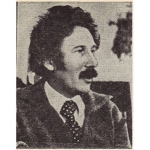I
As once, if not with light regard
I read aright that gifted bard
(Him whose school above the rest
His loveliest Elfin Queen has blest),
One, only one unrivaled fair
Might hope the magic girdle wear,
At solemn tourney hung on high,
The wish of each love-darting eye;
Lo! to each other nymph in turn applied,
As if, in air unseen, some hov'ring hand,
Some chaste and angel-friend to virgin-fame,
With whispered spell had burst the starting band,
It left unblessed her loathed dishonoured side;
Happier, hopeless fair, if never
Her baffled hand with vain endeavour
Had touched that fatal zone to her denied!
Young Fancy thus, to me divinest name,
To whom, prepared and bathed in Heav'n,
The cest of amplest power is giv'n,
To few the godlike gift assigns,
To gird their blessed, prophetic loins,
And gaze her visions wild, and feel unmixed her flame!
II
The band, as fairy legends say,
Was wove on that creating day,
When He, who called with thought to birth
Yon tented sky, this laughing earth,
And dressed with springs, and forests tall,
And poured the main engirting all,
Long by the loved enthusiast wooed,
Himself in some diviner mood,
Retiring, sate with her alone,
And placed her on his sapphire throne;
The whiles, the vaulted shrine around,
Seraphic wires were heard to sound;
Now sublimest triumph swelling,
Now on love and mercy dwelling;
And she, from out the veiling cloud,
Breathed her magic notes aloud:
And thou, thou rich-haired youth of morn,
And all thy subject life was born!
The dang'rous Passions kept aloof,
Far from the sainted growing woof;
But near it sate ecstatic Wonder,
List'ning the deep applauding thunder;
And truth, in sunny vest arrayed,
By whose the tarsel's eyes were made;
All the shad'wy tribes of Mind,
In braided dance their murmurs joined;
And all the bright uncounted powers
Who feed on Heav'n's ambrosial flowers.
Where is the bard, whose soul can now
Its high presuming hopes avow?
Where he who thinks, with rapture blind,
This hallowed work for him designed?
III
High on some cliff, to Heav'n up-piled,
Of rude access, of prospect wild,
Where, tangled round the jealous steep,
Strange shades o'erbrow the valleys deep,
And holy Genii guard the rock,
Its glooms embrown, its springs unlock,
While on its rich ambitious head,
An Eden, like his own, lies spread:
I view that oak the fancied glades among,
By which as Milton lay, his evening ear,
From many a cloud that dropped ethereal dew,
Nigh sphered in Heav'n its native strains could hear:
On which that ancient trump he reached was hung;
Thither oft, his glory greeting,
From Waller's myrtle shades retreating,
With many a vow from Hope's aspiring tongue,
My trembling feet his guiding steps pursue;
In vain— such bliss to one alone
Of all the sons of soul was known,
And Heav'n and Fancy, kindred powers,
Have now o'erturn'd th'inspiring bowers,
Or curtained close such scene from every future view.



















Comment form: